Award Books by Genre: Hugo Award
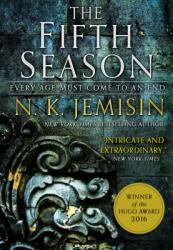
It’s been a while since I’ve read a fantasy book with such a unique magic system in place. I truly enjoyed the amount of thought that went into a world where the main source of power was that of the earth itself. From magma to solid obelisks, the ability to control the vibrations of the planet (either to amplify or dampen) had an interesting and logical follow-through in its characters and storyline. I’m honestly looking forward to eventually starting the next book in the series since the world was built so well. It’s no wonder that it ended up winning the Hugo Award for that year.
While I suppose The Fifth Season is also partly a pseudo-post-apocalypse story, it was only shown in small snippets and references here and there. Consequently, this would make this story almost “modern fantasy” in comparison to some of the classics. Additionally, this would explain some of the character elements added with little to no explanation or relevance to the plot. It sometimes seems like the sexual encounters and fluid genders of these characters are included o merely hit a checkbox of “inclusivity.” Sure, people who relate to these characters feel like their represented, but if these traits don’t affect the plot, then it doesn’t matter about their sexuality at all.
I also found the bold choice of second-person POV to be a bit jarring when it spliced in the more traditional third-person narrative. Initially, I thought these segments were striking in the way that it pulled me into the story. That was until I was given a name and a purpose and any number of other traits that made the “you” in the story into a character that was basically repeated throughout. I get how these different characters interacted to tell a much broader story (which is again, part of the book’s strength) I just didn’t care for the reader’s identity to be given to them via the second person POV.
A uniquely written and crafted fantasy with one or two minor flaws, I give The Fifth Season 4.0 stars out of 5.
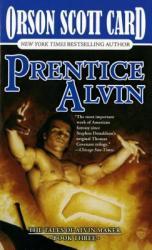
As I’ve been reading through the Tales of Alvin Maker series, I have found it interesting to see what big societal issues have been covered so far. While Seventh Son tackled religion and Red Prophet delved into politics and war, Prentice Alvin bit off a big chunk of racism and tried to address it in a way that’s half fantasy and half historical fiction. Sure, there’s still some semblance of the religion content present in this book that informs the racism dialogue. Still, these large issues end up taking a back seat to the more fascinating aspects of the titular character learning how to control his incredible powers.
In fact, this might be my favorite book of the series so far. It’s always more entertaining to watch a character come into the depth of their abilities, and Prentice Alvin has this in spades (both metaphorically and literally). While there weren’t many instances of Alvin directly being affected by a conflict that would require him to grow as a character, there were enough inevitable plot points that made me wonder how he would handle the situation. These twists helped to enforce the world-building that Orson Scott Card has excelled at for some time.
Perhaps the reason why I like this book as compared to its two predecessors comes down to how it focused more on the “magic” of this alternate history and less on the similarities to the American historical context. I’ve never been much of a fan of historical fiction, but I do appreciate explaining the events of the past through the lens of magical realism or fantasy. It’s likely why I’ll keep reading this series for the time being. At the very least, I’m curious how Alvin will grow from here, as he’s developed into a strong character who can basically do anything he wants.
A magical take on addressing the racism of America’s past, I give Prentice Alvin 4.5 stars out of 5.
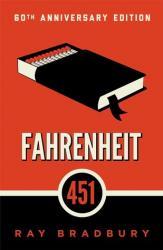
Fahrenheit 451 is a classic book that most people have heard the title of. With a similar style to Aldous Huxley’s “Brave New World”, Fahrenheit 451 takes the reader into a future where books are outlawed and the people of this alternate future are basically mindless robots. The people of this future have an intake of mindless media that even surpasses that of us currently. The main character is a firefighter but different from what we are used to. These firefighters fight with fire, burning houses and books if they are found since they are against the law. But soon after meeting a girl who does not conform to this society’s media consumption, the main character begins to rebel and go against the norm. Fahrenheit 451 is a spooky prediction of what the future will hold and after reading it, I can already see us as a society heading on this path. A truly incredible read, Fahrenheit 451 is a novel that cannot be missed.
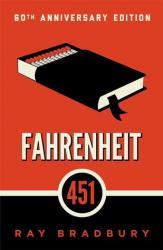
I originally purchased Fahrenheit 451 because it was an option on a summer reading assignment; the book seemed interesting based on the description but it wasn’t a book I would normally pick up. Fahrenheit 451 takes place in a world where firefighters no longer put on fires but burn books. Guy Montag is one of these firefighters though he has never really considered why he became firefighter or why books are burned. On his usual way home Guy meets Clarisse, a young neighbor, who is curious about why thing are how they are.
Clarisse asks Guy why he became firefighter and if he has read a book. While at first Guy finds Clarisse’s curiosity foolish, he begins to realize he had been a the fool all along. This book has been eye opening, I have never thought about the subtle censoring in books, and the way many things are mindless, pointless, and short. While with many books are so action packed you can’t put them down, this is not the case with Fahrenheit 451. With this book I was able to slow down, imagining everything detail, and just think about the theme. This book is a classic for a reason, the message is meaningful. The events that created the setting of Fahrenheit 451 seemed a little too relatable, and it really got me thinking about censoring in our society. This on the shorter side and it is definitely worth your time.
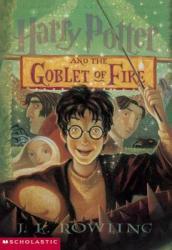
Harry Potter and the Goblet of Fire is a fun and entertaining book to read. Harry is at Hogwarts school of Witchcraft and Wizardry with a new defense against the arts teacher, Alastor Moody. Finding out that Hogwarts is hosting the triwizard tournament everyone is excited. Having to be a certain age to compete in the tournament Harry is not aloud to participate.Two other schools come to compete in the games. One person from each school will contend in the games. When the night when students names get chosen out of the goblet of fire it spits out three different names and then Harry Potter. Harry is shocked. After Dumbledore agreed that Harry could play, they begin the triwizard tournament. the first challenge is for each person to take a golden egg from a dragon. the second task was to figure out a way to breathe under water and save someone. The third and most difficult task was to go through a maze and reach the triwizard cup first. Harry and Cedric the other Gryffindor contestant decide to touch the triwizard cup at the same time. The cup was bewitched and brought Harry and Cedric to a graveyard. And Voldemort comes back.
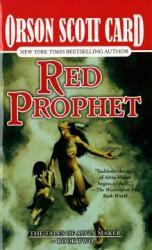
Continuing from the previous book in the Alvin Maker series, Red Prophet flashes back and shows certain events from a different point of view before driving forward into some fascinating alternate history. I continue to enjoy the fantastical elements brought into American history, even to the point of explaining how certain famous historical figures were the way they were. Although, if you know enough history, you’ll realize the fates of some of the characters presented in Red Prophet (William Henry Harrison, for instance) might not need the foreshadowing missing from this text.
While Seventh Son managed to set up this alternate history and establish some of its rules, Red Prophet delves into the action and excitement that comes from some of the more “kinetic” talents of these characters. Once the plot catches up with where Seventh Son left off, I was hooked. The interactions between Alvin and the Native Americans were quite interesting, and I found everything up until the climactic battle to be top-notch storytelling. Sure, it took a little while to get there, having to first set up the eponymous “Red Prophet” and his powers of observation, but it was worth it in the end.
My one qualm with this book lies in some of its more peculiar metaphor, allegory, and allusion. Near the end of the book, several scenes and sections feel entirely disjointed from the narrative. Perhaps they were to serve some “higher purpose” to lay out the moral of the story—or even the series as a whole. These scenes had characters who suddenly were ripped out of their normal behavior and put into a completely different context. And for what? To show that the history of the Native Americans is rich and varied while also infused with war and darkness? There had to be some other way to convey this than the way it was done here.
An action-packed follow-on to Seventh Son that gets a little too “heady” at times, I give Red Prophet 4.0 stars out of 5.
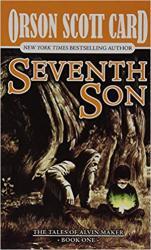
Having loved Orson Scott Card's Ender Saga, I decided to start into another of his series, Tales of Alvin Maker. I was used to his science fiction writing, so I thought it would be interesting to see how he handled semi-historical fiction. For the first book in a series, Seventh Son certainly has its strengths and weaknesses. It’s clear this book came on the heels of the Ender Saga, as there are a lot of parallels between characters and motifs that I just couldn’t ignore. Not that that’s necessarily a bad thing by any means.
While the history of colonial America is the setting of Seventh Son, the fantasy elements added to it made for an interesting read. I did appreciate the distinctive “good vs. evil” conflict between the Makers and the Unmaker, even if it’s a little too tried and true. At the very least, while the religious characters had some amount of strawman characterization set against them, they were well rounded enough not to make the whole story seem too anti-Christian. They weren’t necessarily the enemies, but their ignorance factored into the enemy’s tactics.
Perhaps the little snippets of American history sprinkled throughout this book were what intrigued me the most. Sure, the superstition and “magic” involved in creating an alternate timeline of history made quite a bit of sense. However, without at least a cursory knowledge of these events and historical figures, then readers could potentially miss a lot of substance. As with the Ender Saga, Card uses his writing to dive into different theologies and philosophies that do more than merely entertain. The fact that books like this can be thought-provoking through solid characters is a testament to his talent as a writer.
An adequate start to a series with plenty of potential, I give Seventh Son 4.0 stars out of 5.
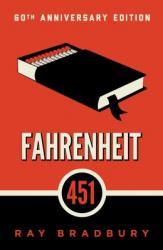
Guy Montag, a fireman who lives in the future where all books are banned, is required to burn them all. Guy then meets a strange girl who explains how books aren't so bad. He begins to spend more time with her and as more fire calls end up worse and worse, his point of view on books is eventually changed. Guy becomes a rebel to the fire company, as he tries to stand up to what is right. He later meets with an ex-professor who helps him generate a plan. Will he succeed? Read this book to find out. I would recommend this to anyone who wants to read about an alternate point of view on the future and readers who like technology as well as robots.
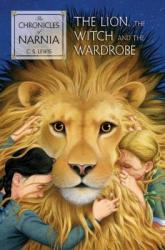
When 4 british school children are sent away during World War II to a old professers home the have no idea what adventures are there. The children find a wardrobe in a room of the house and enter it where they find themselves in a magic land called Narnia. This book is full of adventure and is a good read for people of all ages.
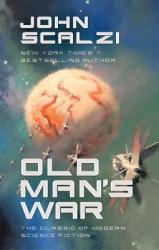
An excellent adult Sci-Fi novel in a future where to join humanity's military, the CDF, you must be 75 years old. Interesting takes on aliens, human interactions with other species, and combat. Be warned, there are sections of this book that go quite in depth about the background of certain story elements and they can seem long winded, but they all contribute to the story at large. Great read and hard to put down once you've found a little traction.
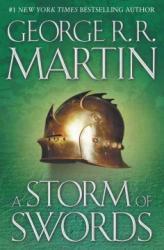
If things hadn’t already turned dark in Westeros, they certainly do in A Storm of Swords. The complicated political situation in the end of A Clash of Kings gets even more complicated as this third book dives into complex armies, weddings, wars, and so much more. George R. R. Martin’s writing may be dense, but I have never encountered a fantastical world as deeply developed as his. A Storm of Swords is jam-packed with intrigue and excitement, and it left me wanting more. I would recommend this book even if you have already seen the show; reading the books adds a whole new dimension to the characters, the plot, and the world.
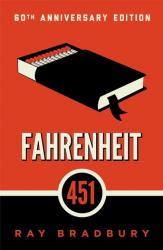
With this dystopian society reversing positions in society, firefighters burn books and light houses on fire. Montag, a veteran firefighter, soon meets a girl who changes his mind about life, books, and his job. Soon, this mystery girl disappears and Montag soon sets out on a risky adventure to solve the mystery of his lost friend. With him betraying society, reading intriguing literature, and meeting new friends, the society is out to find Montag. Will he escape into the unknown world or will he be caught with his fate unknown? This book is an adventure worth reading!
Reviewer Grade: 9th
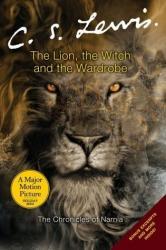
The book, The Lion, The Witch, and The Wardrobe, by C. S. Lewis, is a wonderful read. The classic can be read by any ages and provides a fulfilling story in a fantastical world. The straightforward plot and character development also add nicely to the book's universe. The book also provides illustrations adding to the imagery of Narnia, the world in which the book is in. Overall, The Lion, The Witch, and The Wardrobe is a phenomenal book that can give any reader a great experience.
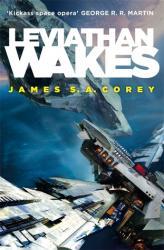
Leviathan Wakes is the first novel in the science fiction series, the Expanse. It follows the stories of Jim Holden and Detective Miller as they attempt to uncover a plot to start a war within the planets. This book is incredible. Every character feels alive and unique, and you really begin to connect with them as the plot moves forward. The plot itself is stellar, and is relentless in its suspense, intrigue, and action. I would highly, highly recommend to anyone who loves science fiction, or is just looking for an amazing book to read.
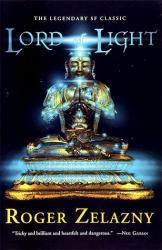
Lord of Light, winner of the 1968 Hugo award for best novel, is a fascinating excursion into a expertly crafted science fiction world involving both Hindu mythology and the struggle to free humanity from the oppressive rule of false gods. This book is exciting as well as thought provoking and an overall interesting read. The characters are well flushed out, the setting is both believable and fantastical, and every instant of the book engaging. For those not familiar with Zelazny's writing style, the book may become confusing at certain points. However, the reader is never lost completely and can easily catch back up with the story. This book is a must read for those interested in the science fiction genre.
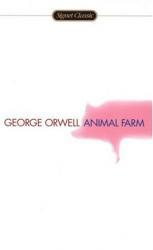
"Animal Farm" by George Orwell is about a seemingly normal farm that turns against their farmer. The animals take over the farm with the help of their leaders who are pigs. After all the humans are gone from the farm they continue under the rule of the pigs and create a system of rules to follow as a guideline for their new life. Everything goes well until one of the pigs, Napoleon, uses the dogs he trained to remove the other leader, Snowball, from the animal farm. With Snowball gone Napoleon takes complete control of the farm. He alters the rules made by Snowball, abuses his power, and makes poor decisions that negatively affect the other animals. One of their rules/guidelines was that humans were evil and not to be associated with.
Napoleon breaks that rule many times starting with making a trade of wood with another farm run by a farmer. They get scammed from the exchange with the human, but that doesn't stop Napoleon from dealing with humans. He goes to the extent of not telling the fellow animals the truth and putting all pigs above everyone else. From there things get progressively worse until Napoleon eventually befriends the humans along with the other pigs. They become so much like the humans that it gets to the point that the pigs are basically humans.
I would recommend the book. "Animal Farm" is interesting and in my opinion is in a sense satire, so I really enjoyed it. I read this book because I was planning on reading 1984 by the same author for a BTS theory and wanted to read other books by George Orwell. I kind of could relate to some of the animals because when they disagreed with Napoleon they brought up good points, but no one listened to them. The ending is very surprising and the book isn't predictable.
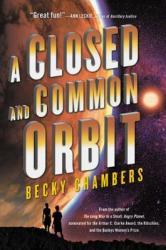
After the refreshing sci-fi The Long Way to a Small, Angry Planet , I was ready to follow the crew of the Wayfarer to their next adventure. Unfortunately, the sequel, A Closed and Common Orbit, decided to take a path more akin to The Godfather Part II (1974). Instead of following the main characters of the first story, this sequel delved into the new life of the AI now known as Sidra, while also interspersing a quasi-related prequel story of one of the new characters introduced in this book. Fortunately, these two stories were well paced against each other.
Even though I feel readers could pick up this book without having read The Long Way to a Small, Angry Planet, there are certainly a few details about the diverse races found in this universe left out of this book—probably for the sake of brevity. This didn’t necessarily detract from the enjoyment of A Closed and Common Orbit, but having that previous knowledge certainly helped to bring these alien creatures to life in my mind. Still, the main characters are basically humans, so the interactions with the aliens would be the main reason to know how these creatures communicate.
While this book is only tangentially related to the one that proceeded it in the series, the universe the author has created is solid enough to support a few more additional stories like the ones found here. With fewer characters to focus on in this book, A Closed and Common Orbit was able to dive deep into some pretty heavy topics, including child slavery and artificial intelligence. The writing still retains its casual dialogue style that genuinely helped bring these few characters to life. If anything, the author’s writing is what will keep me coming back to this series.
A mostly unrelated, but still expertly written sequel, I give A Closed and Common Orbit 4.0 stars out of 5.
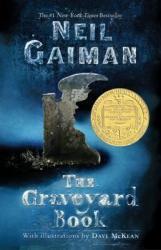
Nobody Owens (Bod for short) grows up in an ancient cemetery, raised by the spirits who reside there. As he becomes older, along with his school lessons and the special abilities given to him with the “freedom of the graveyard”, Bod must discover the secrets behind the death of his birth family, and the "Jacks of All Trades” (a dangerous secret society). Along the way Bod learns from various night creatures in addition to his extended family of ghosts, including ghouls, a witch, a werewolf, and a vampire. He must use all the knowledge that he acquires to fulfill his pivotal role in defeating the Jacks.
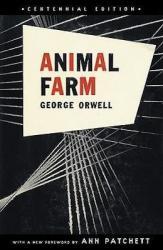
Animal Farm is a dystopian novel about a farm overrun by the farm animals. The animals revolt and create their own hierarchy, which poses an overarching metaphor for humanity. Like many of Orwell’s books, this book exposes the flaws of mankind in an allegorical manner. I chose this book for its dystopian nature, and it did not disappoint. It is artful in its satire, and Orwell takes a clear stance on tyranny. This is among the best dystopian books I have read.
Reviewer Grade: 12
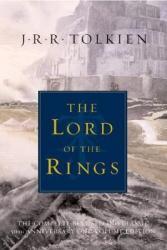
A stout story, a rich song, a tale for all times. Tolkien heard the gorgeous music of narrative, with all its valleys and hilltops, with all the grit of the fight, all the glory of overcoming, all the long, drawnout parts of day-in and day-out small faithfulness. He heard a musical narrative and he composed a symphony. But like all great masterpieces, one’s affections and tastes must be enlarged and strengthened to enjoy wine this strong. Such a stout story is not for the faint in heart. In an era where our literary sensibilities are cheapened by bland paperback fiction, reality TV, inane tweets, texts, and Facebook posts, we are a society easily pleased by cultural fast food, and we often can’t appreciate with the robustness of a story told this well. There are answers in this story to questions we’ve never thought to ask. This story explores places in the heart we’ve never thought to search, depths of the human soul we’ve never considered worth pluming. If we don’t resonate with this story it is because there is much that the author wants to tell us that we are not yet ready to hear.
Search the world over, and I don’t believe you’ll find another piece of fiction as epic, as moving, as heart-transforming, as the Lord of the Rings Trilogy. What sets the literary genius of Tolkien above most other authors of fiction is his ability to make his imaginary world shine with such brilliance that the affections of the heart will come to love its shores, its stories, its struggle to stay in the light. Story is one thing that cannot be faked by a shallow writer. Either an author has within him an tale of inspiring beauty, of struggle, of overcoming, of fighting and conquering, of living and dying for what one believes in—or he does not—and what comes out instead is flat, bland, one-dimensional.
But if one is willing to be a patient learner, one can have one’s mind and heart expanded by being a slow and thoughtful reader. If your heart does not sing by the end of the book, if you do not have a new resolve to overcome the evil in your own heart, if you are not transformed to live for truth and beauty by the end, then I wonder that you have a pulse.
The only precaution I give you is the peculiar feeling of sharp disappointment that will pang you as you read the last line of last volume, knowing that the book is over and there will never be another like it. The only solace I allowed myself was the thought that soon my children will be at an age to appreciate it and I can relive the volumes through their imaginations. Be prepared to mourn for the series' finitude even as you enjoy every brilliant page.
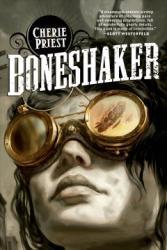
I suppose when I chose to read this book, it would have been a little more steampunk than it was. Sure, Boneshaker has some of the trappings of a steampunk story, like the Civil War and inventions comprised of brass; but in the end, it felt more like light window dressing than something important to the plot. Surprisingly enough, this book was more along the lines of a zombie apocalypse novel than a steampunk one. In that sense, I’m disappointed that the cover didn’t completely deliver on its premise and instead decided to rely on the tropes of the post-apocalyptic genre.
The characters themselves were somewhat interesting, but their motivations seemed a little flat. The boy who wants to find his father and the mother who chases after him aren’t that compelling. In fact, the journey of both characters could have probably been accomplished via one of them, with supporting characters providing information about the other one. If anything, the plot was only used as a method to explore this semi-steampunk Seattle. This meant that, by the end of the book, there were quite a few more questions I had than answers. I guess that’s why there are two more books in this series.
I think my main problem with this book is that it isn’t more thoroughly tied to real history and real locations. Sure, there were a few mentions of the Civil War, but if you removed those few links to history, the story stands on its own pretty well. In fact, you could probably set this anywhere, even in its own, unique world, and it should still work. Because it doesn’t rely on our knowledge of history and familiar places, it doesn’t feel like the “alternate history” that steampunk can provide. In the end, this was a pretty good idea, but it’s misleading in its marketing.
A post-apocalyptic zombie book that has hints of steampunk thrown in, I give Boneshaker 3.0 stars out of 5.
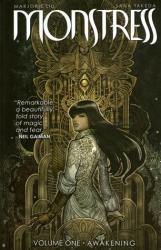
I chose this book because comics are a type of novel that I find interest in. This is a fantasy book that takes place where monsters and humans are divided after a war, and monsters who are caught by humans on the other side are used to be sold and experimented on. The main character, Maika, goes on the other side in search for hope of her mother. This is highly recommended for anyone who enjoys comics.
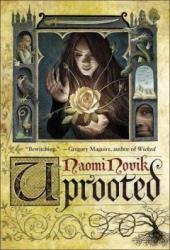
Uprooted by Naomi Novik was an interesting read - with magic and mythical creatures - but I found that in the first few chapters I stepped away from the novel several times. The beginning was slow with not much action, more setting up the scenery and the laws of the land than anything else. The novel follows a girl named Agnieszka living in a quaint village called Dvernik by a magic infested forest where every ten years a mysterious and immortal wizard called the Dragon, who lives in a nearby tower, visits to pick one woman as payment for protecting Dvernik from The Wood. Agnieszka is chosen to her surprise, but her interactions with the infamous Dragon are almost boring - they share a typical, overused trope in a love-hate relationship that frustrates the reader. The two are also locked away in the tower where there are minimal outside interactions from any other characters for almost the entire first half with the exception of one of Agnieszka‘s bedridden friends. I found that the last half of the novel was the most interesting because that was when other characters from the faraway capital were introduced and the scenes were more fast-paced. Because the world building aspect in the beginning was making me impatient, the problem was that later when Agnieszka returns to her village, I spent a long time away from there that the characters and their relationships were hard to remember and I personally did not care for them. There were definitely characters I met in the last half that I empathized or was absolutely lucid with and I did enjoy all the plot twists because, of course, they were unexpected and added some excitement to Uprooted. Overall, the beginning takes off one star for me due to the inaction and some common young adult tropes were utilized, but I loved most of the characters and the plotline anyway regardless of the latter.
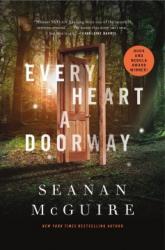
A fascinating and dark book. The premise is enjoyable. I adored the thought of a home for kids who went to other worlds. The kids could be summed up in one word: PTSD. And they were perfect, with complex backstories and hopes and dreams. The world's were even better, from the silent Hall of the Dead to the Moors, a world hovering between the lightning strike and the resurrection. I couldn't put the book down. In fact, I wish it was longer so I could spend more time in the rich world with its people. From a dapper mad scientist to a girl who ran on rainbows, they are all unique. And I love them for it. I love their interactions and their longing for the world's they had seen. The question was, who would murder to go back to the place they considered home.
Reviewer Grade: 10
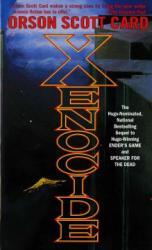
Much like authors Jules Verne and H.G. Wells were well ahead of their time in their science fiction writing, Orson Scott Card once again shows that he understood some of the key concepts of our universe. Written in 1991, Card’s Xenocide deepens and furthers the continuing adventure of Ender Wiggin that he began back in Ender’s Game . Picking up where Speaker for the Dead left off, Xenocide adds a powerful adversary while also tying plot points back to the first book in the series. In this sense, the tight intertwining of Xenocide with its predecessors makes it difficult to separate and review by itself.
I appreciate what Card has done by creating a multi-book narrative that requires the reader to have started from the very beginning of the story.
While Xenocide is not nearly the end of the series, as made clear by the astounding twist near the end, it does pull enough unresolved threads from Ender’s Game and Speaker for the Dead to create the next segment of the story. In this sense, the whole story is a multi-book epic so well-written that no detail or specific piece of continuity is overlooked. Plus, with so much history behind it, Xenocide reads at a frenetic pace, just trying to “beat the clock” of an almost assured planetary destruction.
Surprisingly, if you told me that there was a sci-fi book comprised almost entirely of dialogue and profound, philosophical arguments, I would probably assume it was boring (or at least written by Robert Heinlein). And yet, Card has brought the reasoning proposed in the previous books of this series and pulled them through to their logical conclusions, creating an engaging discussion of artificial intelligence and sentience, while wrapping the whole thing in the context of moral arguments for and against exterminating an entire species. There are no easy answers in this book, but Card has masterfully included concepts like cloud computing, interdimensional travel, and genetic engineering to get his point across.
A fantastic continuation of Ender Wiggin’s story that leaves the reader begging for more, I give Xenocide 5.0 stars out of 5.
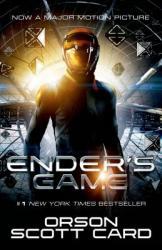
Ender's Game is an enthralling and thrilling sci-fi following a young boy as he is prepped to save the world. Ender departs for battle school at the ripe age of 6, where he is thrust into a world were children go head to head in a competition to be the best, fight in an all out war, and earn all the glory.
Although young and inexperienced, Ender is the best. But things seem to be stacked against him....
Orson Scott Card writes with incredible dexterity and Ender's Game pulls you into a new world.
(Reviewer Grade: 12)
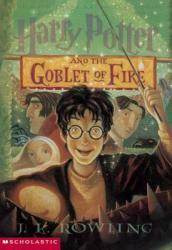
If you love fantasy/adventure books PLEASE READ THIS BOOK! This is such an awesome book! It is not predictable and contains a cliffhanger at the end.
Some of the characters’ drama is relatable to the reader (such as the teenager dating scene). This is the fourth book in a seven book series. The books will make a lot more sense if you read the books in order. This was definitely one of the best books I have read this year!
Reviewer Grade: 8th
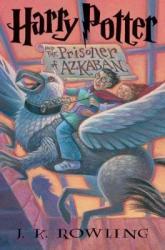
“Harry Potter and the Prisoner of Azkaban” is an amazing book to read. It is a fantasy book with some adventure in it. It is the third book in a seven book series. The story will make a lot more sense if you read the books in order. This book is not predictable and does not have a cliffhanger. However, there are some parts of the book that will leave you on the edge of your seat in suspense. Some of the characters are relatable to the reader but the story isn't at all. This was one of the best books I have ever read!
Reviewer Grade: 8th
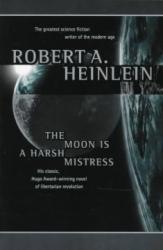
Certainly well ahead of his time, Robert A. Heinlein remains one of the definitive writers of the science fiction genre, even today. In The Moon is a Harsh Mistress, Heinlein covers such topics as artificial intelligence, extraterrestrial colonization, and interplanetary warfare. Even today, most of these subjects are accurately depicted in the narrative, even if some of the technology has advanced past where it was thought to be in 1965. Part of me is almost jealous at Heinlein’s ingenious use of Earth’s gravity well, and I know any attempt I might make to replicate the idea will merely seem derivative in comparison.
As is the case with some of his other works, Heinlein makes many socio-political statements via his writing. His stance on taxes, revolutions, and independent governing bodies is a critical section of the plot in The Moon is a Harsh Mistress, and I can certainly see the theoretical benefits he puts forth in this context. That being said, his views on polygamy and polyamorous relationships are certainly on display again, with his previous work, Stranger in a Strange Land exploring these themes in greater detail. I can only assume the "free love" culture of the 1960's shaped these opinions.
Overall, the book wasn’t quite what I expected. The initial chapters made me hope the plot would center on the relationships between man and artificial intelligence (AI). If anything, AI is shown to be a powerful tool that can influence society in ways we can’t even begin to comprehend. At the very least, the main character was quite entertaining, if not hard to understand at times with his “accent.” If we do eventually colonize the moon, I can hope we do so peacefully and in a way that doesn’t lead to an uprising of its native inhabitants. After all, I do like living in a Colorado Springs devoid of meteoric bombardment.
A well-thought out sci-fi story decades ahead of its time, I give The Moon is a Harsh Mistress 4.0 stars out of 5.
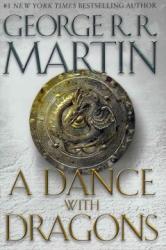
Not only has the release of George R.R. Martin's "Song of Ice and Fire" book trilogy garnered international acclaim, but it has also brought together a diverse community of fans, all of whom share an appreciation for the masterpiece they see in Martin's work. From novel to novel, Martin has continued to enthrall his fans with plots upon counter-plots, timeless lore, and brutally realistic characterization. Suffice it to say, fans were displeased when the six-year waiting period struck between the third and fourth installment. Now, with "A Dance with Dragons" well past its release, fans beg the question, "How does the fourth novel stack up to its prequel 'A Feast for Crows' and the other books?" To answer that question, I would say A Dance with Dragons has trumped the three previous novels, and exceeds the quality of Martin's previous work.
In A Feast for Crows, the plot left out the happenings of Tyrion, Jon, and Daenerys. Luckily, however, this new novel pays most of its 1000+ pages to these plotlines. With the war over, attempts for peace in King's Landing are made, but as Tyrion reaps havoc in the capitol, he flees across the Narrow Sea to meet with the rumored "Daenerys Targaryen".
She has done quite well for herself, having managed to take power, wealth, and respect form the former masters of Slaver's Bay. Though as old conflicts are settled, new ones arise, and Daenerys soon finds that governing over a foreign city is a challenge.
Up in the North, the 998th lord commander of the Night's Watch, Jon Snow, faces distrust among his brothers. Yet in spite of their squabbling, a bigger threat looms across the Wall, with the Others inching closer to the Seven Kingdoms.
In addition to these major plotlines, there are of course reappearances from a range of other characters. Their plots are befit to twists, turns, and outright bewilderment, able to surprise even some of the most observant readers.
I read this book immediately after finishing the last, and can say that I am pleasantly surprised with it. The plotlines continue to complicate, and intrigue readers ever-further in this timeless trilogy.
One complaint I would file with this novel is that due to Martin's fragmented writing style, for which certain books focus primarily on particular plotlines, I felt that some information was hard to remember or keep track of. I would definitely recommend brushing up on a summary of "A Storm of Swords" beforehand, as a way to refresh yourself on those details.
If you decide to not continue with the trilogy, my recommendation has to go to J.R.R Tolkien's "Lord of the Rings" trilogy. While it's true that the novels are highly similar, Tolkien's work makes up for some of the imperfections in Martin's.
Overall, from my opinion, A Dance with Dragons is certainly an improvement on the last installment in the trilogy, and stands to be one of the better "Song of Ice and Fire" novels. If you are this far into the series already, I would have to say that it's worth continuing. The timeless and rich storytelling found in Martin's novels makes for a read that simply cannot be passed up!
Reviewer Grade: 10